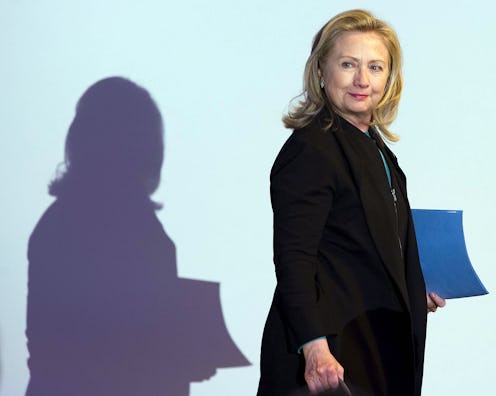News
Clinton's Ominous History With Prison Reform
Hillary Clinton on Wednesday released a $10 billion blueprint combating America’s growing substance abuse problem, especially in rural regions where heroin overdose has become an epidemic. The plan was inspired by a string of voters who raised the same issue across different states. "Twenty-three million Americans suffer from addiction, but only 1 in 10 get treatment,” she writes in an op-ed in the New Hampshire Union Leader newspaper, which is totally worth a read (if you aren't too busy reading her State Department emails). In addition to improving preventative measures and treatment, the plan calls for the transition of nonviolent drug offenders from oversaturated prisons to community support programs. But it's good to see Clinton address drug abuse, as invoking criminal justice reform hasn't always been so favorable for her.
Addressing a problem that kills more people than car accidents each year, her initiative will help local governments launch preventative programs at schools and communities, expand long-term mental health treatment for addiction, and ensure that emergency medical workers always have naloxone, which prevents death from overdoses. The follow-up on her proposed reform of the criminal justice system is wedged into this call to action. Her plan sets five goals, the last of which is to "prioritize treatment over prison for low-level and nonviolent drug offenders," she writes, "so we can end the era of mass incarceration."
But mass incarceration has been a tricky subject for Clinton. In April, when Baltimore was in the midst of riots following Freddie Gray's death, she intrepidly called for a total overhaul of the racially biased system of mass incarceration that perpetuates social inequality. "There is something wrong when a third of all black men face the prospect of prison during their lifetimes. And an estimated 1.5 million black men are 'missing' from their families and communities because of incarceration and premature death," Clinton said in her speech at Columbia University.
However, critics were quick to call her our on hypocrisy. In her husband's first term as president, Clinton lobbied for legislation that actually heightened the war on drugs and kickstarted mass incarceration. After the Violent Crime and Law Enforcement Act was signed into law in 1994, federal funding for prisons increased by $19 billion, while public housing lost $17 billion. In the eight years under Bill Clinton's administration, the number of federal prisons doubled. As Charles Blow of The New York Times points out, Bill Clinton apologized at an NAACP conference last month. "I signed a bill that made the problem worse," he said.
This piece of shady history was brought to the forefront two weeks ago, when GOOD magazine released videos of an exchange between Clinton and three Black Lives Matter activists. Backstage of a campaign event that had just ended, the activists fearlessly implicated the former secretary of state's part in rising mass incarceration.
"You, and your family, have been in no uncertain way partially responsible for this, more than most," Julius Jones, one of the activists, said in the video. Citing her involvement in the Civil Rights Movement and even explicitly acknowledging that the system is, indeed, tainted by racial prejudice, Clinton responds with calm empathy but comes short of apologizing.
The emotional peak of the video was when Jones told Clinton she's asking too much of the Black Lives Movement, that she was asking them to "change white hearts." In a moment of unencumbered ardor, she interrupted him — "I don't believe you change hearts. I believe you change laws, you change allocation of resources, you change the way systems operate," she said, resolute and firmly gesticulating.
Throughout the video — but especially in this moment — she demonstrated her toughness, though it often came off as brash. She was stubborn; she was doggedly unapologetic. And maybe she ought to have reconsidered. At least, for the sake of appealing to the virtue of atonement or just good PR, she could've uttered "sorry" at some point in their 16-minute conversation. But she didn't. And once again, critics chided her evasion of guilt.
The matter of mass incarceration has and will continue to come up again and again in Clinton's campaign. And each time, we will be reminded of her ugly track record regarding the topic — no one knows this better than Clinton herself. If anything, accountability is an essential ingredient in the ideology of democracy.
Yes, an apology would go a long way. But the fact of the matter is that Clinton is churning out some serious policy proposals that would deal with her and her husband's mistakes on a very pragmatic level. This recent proposal, for instance, would ask states to reallocate money from prisons to community support programs. So if she could somehow incorporate prison reform into a plan as universally palatable as eradicating drug abuse, maybe we shouldn't worry over words and sentiments. After all, sentiment is not exactly a girl's best friend when she's trying to rule the world.
